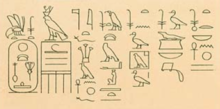Nebankh
| Nebankh | |
|---|---|
| High steward | |
 Inscription of Neferhotep I from Konosso listing the members of his family as well as the Royal acquaintance Nebankh (rightmost column).[1] | |
| Dynasty | 13th dynasty |
| Pharaoh | Sobekhotep IV |
| Father | Sobekhotep, steward |
| Mother | Hapyu |
Nebankh was an ancient Egyptian official of the Thirteenth Dynasty. He is one of the better known personalities of this period.
Family
| ||||
| Nebankh in hieroglyphs | ||||
|---|---|---|---|---|
| Era: 2nd Intermediate Period (1650–1550 BC) | ||||
Nebankh was the son of the steward Sobekhotep. His mother is named Hapyu. His brother Dedusobek Bebi was the father of queen Nubkhaes.[2]
Career
King's Acquaintance
At Konosso, an inscription listing the members of the royal family of Neferhotep I, also shows treasurer Senebi and king's acquaintance Nebankh. Another colleague was king's acquaintance Rehuankh.
High Steward
Under king Sobekhotep IV he became high steward. In this position he went on expeditions to the Wadi Hammamat and Wadi el-Hudi.
Other attestations
Nebankh is known from a high number of monuments, including rock inscriptions and several stelae and a statue, found at Abydos. His heart scarab is so far the oldest datable heart scarab. It is a human-headed green jasper heart scarab with nine lines of hieroglyphics bearing the name of Nebankh.[3]
References
- ^ Karl Richard Lepsius: Denkmäler aus Ägypten und Äthiopien , 1849, Tafel II, Band IV, available online see p. 151 plates e and f
- ^ Kim Ryholt: The Political Situation in Egypt during the Second Intermediate Period. Kopenhagen 1997, ISBN 8772894210, pp. 239–242,
- ^ London, Bristish Museum EA65378; Stephen Quirke: Two Thirteenth Dynasty Heart Scarabs, in: Journal of the Ancient Near Eastern Sociert "Ex Oriente Lux" 37 (2001-2002), p. 31
